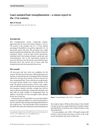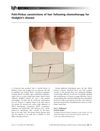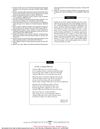 29 citations,
August 2008 in “Current Opinion in Pediatrics”
29 citations,
August 2008 in “Current Opinion in Pediatrics” Hair loss in teenagers is hard to treat and lacks a cure, with some treatments available depending on the type of hair loss.
 6 citations,
October 1993 in “The journal of the Royal Society of Health”
6 citations,
October 1993 in “The journal of the Royal Society of Health” Children's hair loss has many causes and requires careful diagnosis and personalized treatment, including emotional support.
 5 citations,
November 2008 in “Advances in Dermatology”
5 citations,
November 2008 in “Advances in Dermatology” The review highlights the importance of stem cells in hair health and suggests new treatment strategies for hair loss conditions.
 September 2003 in “Clinics in Family Practice”
September 2003 in “Clinics in Family Practice” The document lists dermatology topics across life stages and notes hair loss can affect self-esteem and early skin cancer treatment is crucial.
 10 citations,
July 2007 in “PubMed”
10 citations,
July 2007 in “PubMed” Chemotherapy causes hair loss in cancer patients by affecting both growing and resting hair.
 34 citations,
October 2007 in “International Journal of Dermatology”
34 citations,
October 2007 in “International Journal of Dermatology” The most common causes of hair loss in children in South-East Nigeria are fungal infections and alopecia areata.
 1 citations,
June 2007 in “Journal of Oral and Maxillofacial Surgery”
1 citations,
June 2007 in “Journal of Oral and Maxillofacial Surgery” A woman experienced temporary hair loss after jaw surgery due to the stress of the operation.
 31 citations,
April 2007 in “Experimental Dermatology”
31 citations,
April 2007 in “Experimental Dermatology” Stress in mice delays hair growth and treatments blocking substance P can partly reverse this effect.
 December 2006 in “International Journal of Dermatology”
December 2006 in “International Journal of Dermatology” Mnemonics with one letter are useful and easy to remember for learning dermatology.
 August 2003 in “Journal of Investigative Dermatology Symposium Proceedings”
August 2003 in “Journal of Investigative Dermatology Symposium Proceedings” The document did not provide enough information to summarize the causes of hair loss in pre- and postmenopausal women.
 7 citations,
January 1993 in “Rheumatology”
7 citations,
January 1993 in “Rheumatology” Most skin rashes in rheumatoid arthritis patients were not caused by their medication, and careful evaluation allowed most to keep taking their beneficial treatment.
 90 citations,
June 2006 in “The American Journal of Dermatopathology”
90 citations,
June 2006 in “The American Journal of Dermatopathology” The document concludes that accurate diagnosis of different types of hair loss requires careful examination of hair and scalp tissue, considering both clinical and microscopic features.
22 citations,
July 2006 in “Annals of The Royal College of Surgeons of England” Hair or fiber wrapped tightly around a toe can lead to serious injury if not treated quickly.
 43 citations,
March 2006 in “Seminars in Cutaneous Medicine and Surgery”
43 citations,
March 2006 in “Seminars in Cutaneous Medicine and Surgery” Different types of hair loss have unique features under a microscope, but a doctor's exam is important for accurate diagnosis.

A patient experienced intense hair loss due to telogen effluvium after scalp contact dermatitis, but hair regrew completely within two months without further treatment.
 3 citations,
January 2016 in “Skin appendage disorders”
3 citations,
January 2016 in “Skin appendage disorders” Possible causes of female hair loss include androgenetic alopecia, telogen effluvium, cicatricial alopecia, and alopecia areata incognita; diagnosis and treatment require dermoscopy and histopathology.
 19 citations,
January 2015 in “Journal of Clinical and Diagnostic Research”
19 citations,
January 2015 in “Journal of Clinical and Diagnostic Research” The main causes of diffuse hair loss in women are telogen effluvium and androgenetic alopecia, often related to stress and iron deficiency.
 11 citations,
June 2005 in “Journal of Cosmetic Dermatology”
11 citations,
June 2005 in “Journal of Cosmetic Dermatology” Lasers in hair transplantation show promise but are not yet standard, with current methods causing some side effects and needles still being preferred for creating recipient sites.
 8 citations,
February 2005 in “British Journal of Haematology”
8 citations,
February 2005 in “British Journal of Haematology” Chemotherapy caused the patient's hair to have alternating thick and thin segments.
 240 citations,
February 2005 in “Diabetes Care”
240 citations,
February 2005 in “Diabetes Care” Patients need long-term care after bariatric surgery to manage potential nutritional and metabolic issues.
 6 citations,
June 2004 in “Dermatologic Surgery”
6 citations,
June 2004 in “Dermatologic Surgery” A woman had temporary hair loss after a facelift, which improved on its own within a year.
 2 citations,
June 2004 in “PubMed”
2 citations,
June 2004 in “PubMed” Carbamazepine caused hair loss in a man, which stopped after he stopped taking the drug.
 40 citations,
September 2003 in “Archives of Dermatology”
40 citations,
September 2003 in “Archives of Dermatology” Finasteride slightly better long-term, minoxidil faster initial results, but stopping minoxidil may cause hair loss.
 June 2023 in “Benha Journal of Applied Sciences”
June 2023 in “Benha Journal of Applied Sciences” People with chronic hair shedding have lower antioxidant levels in their blood compared to healthy individuals.
 5 citations,
January 2012 in “Hair therapy & transplantation”
5 citations,
January 2012 in “Hair therapy & transplantation” Hair mesotherapy might help with certain types of hair loss but lacks strong scientific proof and has some risks.
 50 citations,
May 2004 in “Journal der Deutschen Dermatologischen Gesellschaft”
50 citations,
May 2004 in “Journal der Deutschen Dermatologischen Gesellschaft” Estrogens generally inhibit hair growth and improve skin quality, but their exact effects on hair follicles are complex and not fully understood.
 December 2002 in “Archives of Dermatology”
December 2002 in “Archives of Dermatology” The poem ends by asking for case reports on serious health issues like Telogen Effluvium.
 67 citations,
November 2002 in “Journal of The American Academy of Dermatology”
67 citations,
November 2002 in “Journal of The American Academy of Dermatology” The document concludes that careful evaluation is key to diagnose and treat women with hair loss, with tests for thyroid, iron, and hormones as needed.
 18 citations,
March 2003 in “PubMed”
18 citations,
March 2003 in “PubMed” Hair loss in women can be due to abnormal hair growth cycles or damaged hair follicles, with the most common type being androgenetic alopecia; treatment varies by cause, and the psychological impact is significant.
 15 citations,
February 2003 in “British Journal of Dermatology”
15 citations,
February 2003 in “British Journal of Dermatology” The study suggests computer-assisted analysis of scalp biopsies could improve hair loss diagnosis but needs more validation.





























